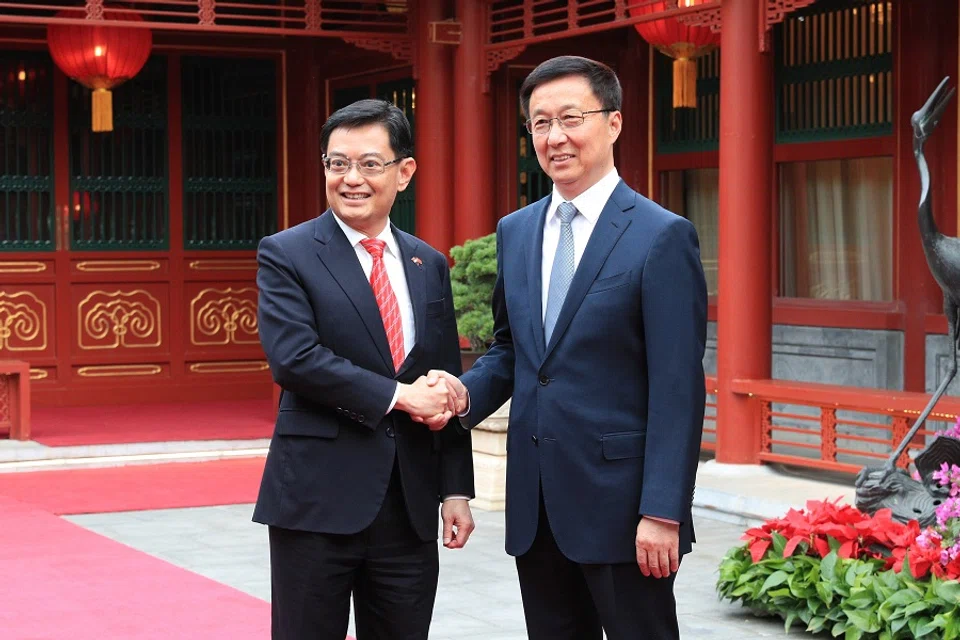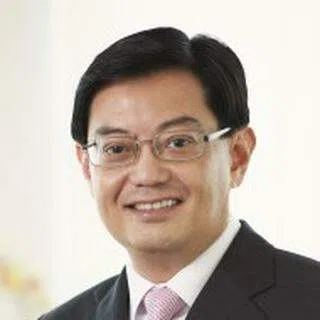Heng Swee Keat: Singapore and China will build better future for region and the world
Ahead of the 18th Joint Council for Bilateral Cooperation (JCBC) meetings between Singapore and China - the first to be held in person since the outbreak of the pandemic - Singapore's Deputy Prime Minister and Coordinating Minister for Economic Policies Heng Swee Keat sets out a few priorities in taking Singapore-China relations to new heights.

Singapore and China enjoy a longstanding partnership, anchored in the strong ties between our peoples and successive generations of leaders. Tomorrow, we will welcome PRC Vice-Premier Han Zheng to Singapore for the 18th Joint Council for Bilateral Cooperation (JCBC), which is the annual apex bilateral forum between our two countries.
Vice-Premier Han is the most senior Chinese leader to visit Singapore since the outbreak of Covid-19. His visit is an opportunity for our countries to take stock of our bilateral cooperation and chart the course for building a more prosperous future for our peoples in an increasingly uncertain global environment.
Recovering from the pandemic
Amidst the Covid-19 pandemic, Singapore and China have continued to deepen bilateral cooperation, including helping each other fight the virus early in the crisis and deepening collaborations in public health. The last two editions of the JCBC were held virtually. Vice-Premier Han's visit to Singapore is a significant milestone, as we look to progressively resume in-person engagements. To do so, we will need a gradual and safe resumption of flights to pre-pandemic levels. We have made some progress on this front, with an increase in weekly flights between our countries in recent months. Even as we manage the effects of the ongoing pandemic in our respective societies, we must continue to work together to boost people-to-people exchanges, which will contribute to our recovery and growth.
Reinvigorating cooperation
Looking beyond recovery from the pandemic, we should also reinvigorate our cooperation to build a better future for our peoples. With changes taking place worldwide at an unprecedented pace, our ability to adapt and innovate how we collaborate will enable us to ride the waves of change with confidence.

Take for instance our first government-to-government project - the China-Singapore Suzhou Industrial Park (SIP). Started in 1994, the first product manufactured in the SIP was hearing aids. This was followed by decades of innovative collaboration, as the SIP continues to reinvent itself with each industrial wave. Today, the SIP is a successful model known for its high degree of innovation.
... the ongoing digitalisation of trade clearances between our two countries will allow for a more seamless flow of physical goods within the region.
Digital domain and green economy
Beyond the traditional areas of cooperation, we continue to embark on new areas of collaboration. Prime Minister Lee Hsien Loong and President Xi Jinping had agreed in October 2021 to strengthen collaboration in emerging areas such as the digital economy and green economy. Since then, our officials have been working closely to advance cooperation in these new growth areas.
In the digital domain, the Singapore-China (Shenzhen) Smart City Initiative has opened new possibilities in digital cooperation and policy innovation. We successfully piloted the use of electronic bills of lading with companies in Shenzhen and are working to recognise our respective digital identities to facilitate cross-border travel and payments. The China-Singapore Guangzhou Knowledge City is also a testbed for smart urban solutions and digital-enabled technology. In addition, the ongoing digitalisation of trade clearances between our two countries will allow for a more seamless flow of physical goods within the region.
The Eco-City has served as a pathfinder for both countries in different aspects of sustainable growth.

Singapore and China's collaboration on sustainability was ahead of its time. The Tianjin Eco-City project was launched in 2008, at a time when climate change was not yet at the forefront of the global agenda. Today, there are more than 130,000 people living and working in the Eco-City, and over 23,000 registered companies. The Eco-City has served as a pathfinder for both countries in different aspects of sustainable growth. As we celebrate the Eco-City's 15th anniversary next year, it is timely for us to refresh its strategies. Beyond the Eco-City, our cooperation on sustainability is gathering pace, including in promoting green finance and deepening green development cooperation.
Progressing with the times
Our bilateral cooperation continues to progress with the times. When the Covid-19 pandemic erupted, we embarked on pandemic preparedness as a new area of cooperation. This continues to be a critical partnership, as the next pandemic is not a matter of if, but when. As our bilateral relationship progresses, additional areas of cooperation will emerge.
At the upcoming JCBC, Vice-Premier Han and I will be discussing how we can reinvigorate cooperation. We will also be witnessing the launch of many new initiatives that will further advance our bilateral partnership.
Regional cooperation
The deepening partnership between Singapore and China will also contribute to building a better future for the region and the world. The foundations and prospects for regional cooperation are strong, especially with the ASEAN-China Comprehensive Strategic Partnership established last year. Singapore and China are also part of the Regional Comprehensive Economic Partnership, which connects ASEAN's economies with its major trading partners and came into force earlier this year. In addition to implementing these arrangements well, we must also proactively realise the potential of these regional networks.
We can also work closely on third party projects, through platforms like the Belt and Road Initiative. The development needs and potential of Southeast Asia are large.

One way to do so is to build upon the Chongqing Connectivity Initiative - New International Land-Sea Trade Corridor (CCI-ILSTC), which is a key component of Singapore's third and latest government-to-government project with China. It offers a shorter and more direct multi-modal route which reduces the time needed to transport goods between Western China and Southeast Asia from three weeks to one. During the pandemic, this became an alternative to traditional trade routes. In the first half of this year, there was a 30% year-on-year increase in cargo flows.
We are now working with China to implement the CCI-ILSTC Cooperation Plan, a developmental framework for the Corridor. Through these joint efforts, and by strengthening both traditional and modern dimensions of connectivity, we can positively impact the development of the region.
We can also work closely on third party projects, through platforms like the Belt and Road Initiative. The development needs and potential of Southeast Asia are large. If the region continues to attract investments from around the world and make reforms, it is on track to become the 4th largest economy in the world by 2030, with a market of over 600 million people. By bringing together the expertise and resources of Singapore and China, we can contribute to realising this potential.
This year's JCBC takes place at a crucial moment for our countries and the world. For China, the recently concluded 20th Party Congress heralds an important new chapter for the country and lays out the blueprint for China's development in the coming years. Singapore looks forward to partnering China to strengthen recovery from the pandemic, reinvigorate our bilateral cooperation to seize new opportunities, and work with other countries to overcome common challenges and build a better future for the region and the world.
Related: Singapore DPM: Singapore can help to better connect China with Southeast Asian markets | Exclusive interview with new Chinese ambassador to Singapore: Six dimensions of China-Singapore relations | Singapore's prominent role in China's trade strategy | Singapore a popular base for China tech firms | Former Chinese Vice-Minister He Yafei: Singapore and ASEAN have important roles to play in a multipolar world | Ambassador Chan Heng Chee: The future of Singapore-China strategic collaboration





![[Photos] Fact versus fiction: The portrayal of WWII anti-Japanese martyrs in Taiwan](https://cassette.sphdigital.com.sg/image/thinkchina/3494f8bd481870f7c65b881fd21a3fd733f573f23232376e39c532a2c7593cbc)